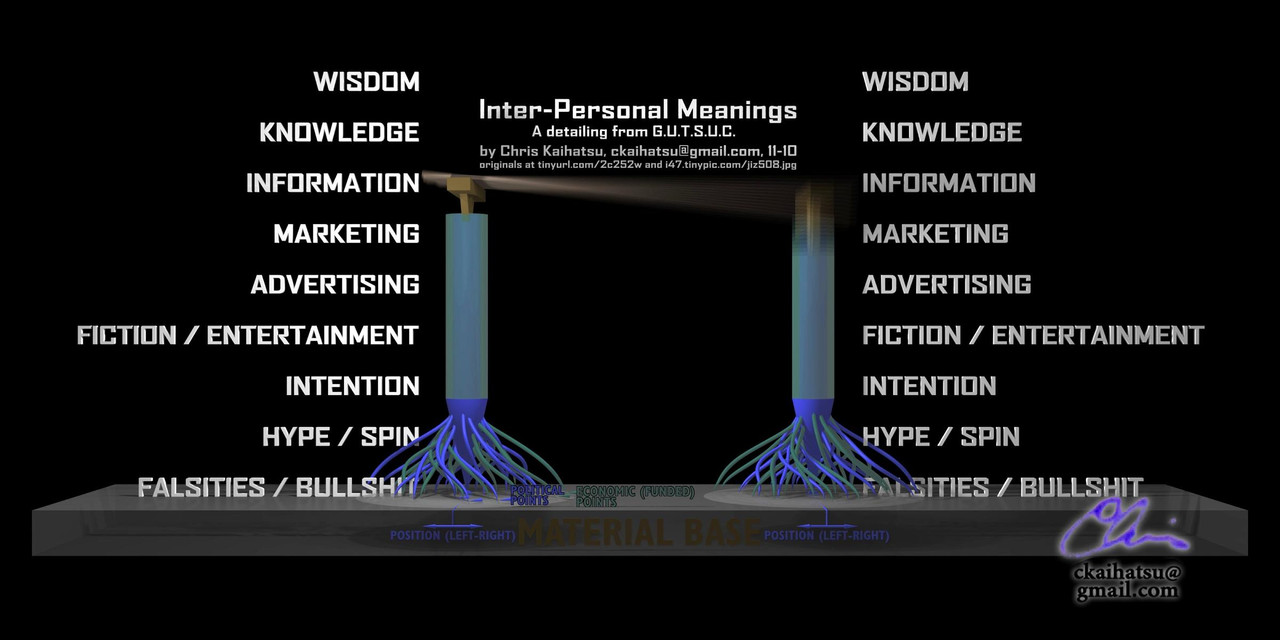Truth To Power wrote:
Strawman.
---
Truth To Power wrote:
legally entitling
ckaihatsu wrote:
Please tell me more about your political philosophy here.
Truth To Power wrote:
The legitimate function of government is to secure and reconcile the equal individual rights of all its citizens to life, liberty, and property in the fruits of their labor.
So if it wasn't for the *genocide*, everything would be *peachy* because things would have gone *correctly*, but they *didn't*, and so now *genocide* is woven into the national historical fabric.
I'm beginning to think that your *entire politics* is one big *should've*, because there's no logistical way to situate the initial *premise* of your geoist politics from where things stand today.
---
ckaihatsu wrote:
The *private sector* has private interests that run *counter* to a social-fabric-type ethos, as is empirically *required* by the markets / business.
Truth To Power wrote:
Only if economic institutions are set up to enable that.
Are we suddenly talking about 'institutions' now -- ?
If you're going to *pretend* to respond to the topic of 'private interests', then you're *way off* by changing the subject.
Private interests are economically *disparate*, though historically they've enjoyed *hegemony* in the political economy and body politic.
The shorthand term here is 'fiscal policy'.
Truth To Power wrote:
It's still irrelevant.
What's irrelevant to *what* here -- ?
That the credit reporting agencies were *bullshitting*, over the total value of half a trillion dollars -- ? Remember, the preceding idea here was that of *executive-type* social organization, back to your glorification of one particular kind of white-collar executive, the CEO.
You think value firehoses out of the CEO's ass, and that's all *anyone* needs to know and believe about capitalist economics.
Truth To Power wrote:
Obviously politics affects economic outcomes. But it doesn't affect economic law any more than the political choice of where and how big to build a bridge affects the physical laws that govern how the engineers will design it. People just like to imagine they can change economic law to suit their wishes.
So, to *clarify*, does politics affect economic outcomes, or *doesn't* it -- ?
Sure, people *like* to imagine they can change the dynamics of the markets, or stop time, or any other movie plot, but capitalist economic dynamics are *impersonal*. My current slogan is 'I don't want to feed the invisible hand any longer.'
Truth To Power wrote:
No, I'm arguing against rent control because it aggravates the very problem it pretends to address; and I favor stable money value because that fulfills its economic function better than unstable value. You advocate rent control and monetary inflation because you think you can change the laws of economics to suit your wishes, and do not know enough economics to understand why those policies are actually self-defeating.
No, you're *imputing* all of that -- I'm *not* a reformist, though I will go-along with whatever socially-constructive reforms may happen to have momentum at the moment, like a rent moratorium.
Maybe a better way of putting it is 'Let's have some of that policy wiggle-room in favor of the *dispossessed*.' You *don't* want rent control, but that only benefits *past purchasers* of whatever non-commodity-productive assets and resources, like rental units or works of art.
It's *insane* that society should reward customers for their past purchases, over and over again, when the product is *inert* and *non-productive* of any commodities, as with land.
---
ckaihatsu wrote:
As the interest rate has recently been *raised*, that favors the capitalist economic faction of *rentier capital* -- which draws economic value from the larger *pre-existing* economy in the form of interest payments and rent payments.
Truth To Power wrote:
You have no idea what you are talking about. None. Increased interest rates make it harder for owners of privileges ("rentier capital") to pay the interest on loans taken out to acquire them, which is why housing (land) prices are plummeting.
You're not *addressing* what I'm talking about, though, so your objection is baseless. You're tangentially going off on something about 'loans', vaguely, which I'm not going to address because you've chosen to hear yourself talk.
Truth To Power wrote:
Garbage. The argument against rent control is the same as against any price ceiling below equilibrium: it causes a shortage. There are other factors that make rent control even worse, but you have no hope of understanding them.
So then it's not about *pricing*, it's about supply-and-demand, or the *lack* of supply (of new construction) when it comes to the housing market, chronically. The shortage was *already there*.
---
ckaihatsu wrote:
If your 'economic realm' really *was* detached from the social-political world, then your 'manipulations' wouldn't really matter because they wouldn't have *any effect* on the social world.
Truth To Power wrote:
No. You think you can build a bridge according to your wishes. I am identifying the fact that a bridge built according to your wishes will fall down when people try to use it.
This isn't about *nation-building*, as you're implying. You seem very *defensive*, and I can assure you that I'm not a rival nationalist. I would support *Lumumba*, historically, but that would be the extent of my nationalism, if any.
Truth To Power wrote:
People do not have less equitable access to housing because market rents increase. They have less equitable access to housing because their natural individual liberty rights to use land have been removed without just compensation, and made into the private property of landowners. As long as you refuse to know the cause of the problem, you will be unable to solve it, and your proposed solutions, like rent control, will actually just make the problem worse. It's like you think the problem with slavery is that the slaves aren't getting enough nutritious food, don't have good housing, etc., and you are trying to solve the problem by making slave owners pay for those things when that will only make them work the slaves that much harder and scrimp on other expenses like their medical care. You can't understand how economic law will not only thwart your desires but cause worse outcomes than if your policies were not implemented.
That's quite a *stretch* to make there, between market affordability, and... *being patronizing to slaves* -- ? What's *wrong* with you? You may want to rephrase.
Again, I'm *pro-rent-affordability*, or against all private property, ultimately, but I don't *seek* reforms within the prevailing bourgeois capitalist political economy.









 - By wat0n
- By wat0n